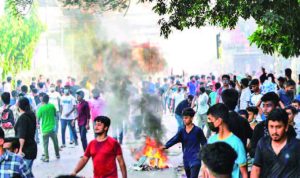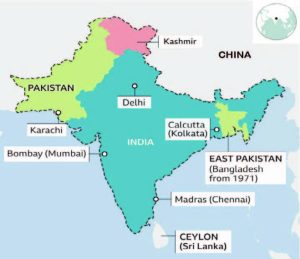Student Rebellion in Bangladesh Inspires Indian Garment Workers here ♦ Kenyan Youth in Rebellion here ♦

Dhaka, Bangladesh, July 18, 2024
Student Rebellion in Bangladesh Inspires Garment Workers in India
“Your defiant chants reach us thousands of miles away.”
BENGALURU (India), July 30— “My grandfather joined the Mukti Bahini (freedom fighters) in 1970 in East Pakistan. The Pakistani army was massacring villages and cities. He had no choice: either join Mukti Bahini or get killed.” A comrade in Bangladesh told this story as that entire country was engulfed by student demonstrations. The government shut down the internet, called in the army, killed thousands of people, and arrested many tens of thousands.
A student group in Dhaka started the protest in early June. Bangladesh is experiencing 40% youth unemployment. Runaway inflation and lack of jobs have affected many students whose parents supported their college education. Many of those parents are garment workers, most of them single women. They were at the forefront of a massive protest which, within a week, became a countrywide insurrection against the government.
The root cause of the insurrection goes back to the 1970 civil war in East Pakistan. The current Bangladeshi government wants to give Mukti Bahini descendants preferential treatment (quota) in employment.
East Pakistan (population about 60 million) was seen as an occupying force. It was economically controlled by the Pakistani army, mostly from West Pakistan. East Pakistan was carved out of India during a bloody imperialist-imposed religious division in 1947.
British imperialism ruled the province of Bengal. It made East Bengal into East Pakistan because most of the population were Muslims. Predominantly Hindu West Bengal remained with India.
Fifteen hundred miles separated West Pakistan from East Pakistan. West Pakistan continued to dominate East Pakistan’s economy.
The successful revolution in China (1949) inspired workers in East Pakistan and West Bengal to organize Maoist communist parties. From 1972-75, communists in Bengal led a massive violent insurrection. They envisioned spreading the Great Proletarian Cultural Revolution from China to India and East Pakistan.
However, Chinese communist leaders were becoming capitalists. A powerful communist movement in India would threaten them. So Chinese rulers supported the US in arming the West Pakistani military to suppress the masses in East Pakistan. They killed over three million people.
That completely alienated the masses. The population of East Bengal, with the help of India and the Soviet Union, formed the Mukti Bahini liberation force, drove out Pakistani forces, and created Bangladesh.
In the 1970s, Mukti Bahini was a guerrilla army. It sometimes fought US-supplied tanks with only sticks and stones. The masses had great hopes that it would change the capitalist system. But once in power, it turned into a hierarchical capitalist army of a new capitalist class.

Bangladesh, since 1971
Garment Workers Today Organize for Real Communism
The new Bangladesh capitalists saw a need for large-scale industrial development. Since garment production in the US and Europe was becoming expensive, they embarked on building a garment industry. This grew rapidly. Now it is the second largest in the world. The percentage of women workers grew from 26% women in 1970 to almost all women workers now. They produce 80% of Bangladesh’s foreign exchange.
The conditions of women garment workers are appalling. Sexual abuse, child labor, lack of pensions, long hours in crowded factories in 40 C (104°F), unsafe buildings – all these are causing more women to see the need to change the system of wage slavery.
Our party ICWP has been able to contact some workers who got the Red Flag. One worker we have known for many years is taking more interest during this rebellion. He is a mass union organizer. Although he has joined another party, he is sympathetic to us. He has put us in touch with other garment workers.
The comrades in Bengaluru are excited about this development. The garment collective wrote a leaflet calling for turning mass rebellion in Bangladesh into a communist revolution. It says in part:
“Your defiant chants reach us thousands of miles away. You have a 500-year history of fighting back. From the British occupiers to the capitalists now, it points to one and only one solution. We need to destroy capitalism and its wage slavery.
“We can build a new society where we will decide our destiny without greedy capitalists. We will build houses, clothes, and food we need. This is not only possible, but it is the only solution.
“To do that you must join our party. When women workers join ICWP, they can give leadership to fight against capitalism. Women and men workers will be more enthusiastic. We have some workers in Sri Lanka, and together, we will fight and win.”
Kenyan Youth in Rebellion
Winds of Change Shake Capitalism’s House of Cards
SOUTH AFRICA, July 24— Massive youth-led protests in Kenya started as a digital activism movement, with young people angry over a government tax bill. It has since evolved into a leaderless widespread protest across all of Kenya. It calls for the President, William Riuto, to resign and for government reforms to wipe out corruption.
From the start, ICWP predicted this protest had the potential to spread to other places in Africa and beyond. As we write, the governments of Uganda and Nigeria have arrested thousands of young people as they try to suppress similar protests.
This shows that the rotten Capitalist system is like a house of cards, When the winds of change blow, it wobbles. What is lacking in these protests, however, is a communist outlook and leadership. With that leadership, the winds would reach hurricane force! Without it, the protests can only lead to temporary gains. Those gains would be reversed over time.
Now, as we speak, there is a great exodus of young people from the African Continent. Millions have left in search of “better opportunities” in America, Europe, and the Middle East. Because of racism, xenophobia and capitalist imposed poverty, most are denied legal means to travel. As a result, the Mediterranean Sea has become a graveyard for thousands of our class siblings.
That is why, as ICWP, we strive for a communist society worldwide. With communism, there won’t be borders to cross. People will move freely. What’s more, we will eliminate the material basis for racism, xenophobia, and poverty. We will eliminate Capitalism.
Now more than ever we need to strengthen the work of the Party by building more collectives. Young people around the world are being left out by the bosses’ system. Some have turned to alcohol and drugs because of hopelessness. That is why we need a strong Party to overcome these challenges.
Lastly, we need to utilize social networks to reach out, not only to these young workers in Kenya, Uganda, and Nigeria, but also here in South Africa. Anything short of communist revolution will land us right back in the misery we face today.
“On a personal note, or should I say a personal criticism,” said a young leader, “I need to show more confidence in our political line by talking about it more to my friends, colleagues, and neighbours. Honestly speaking, we have a superior line.”

